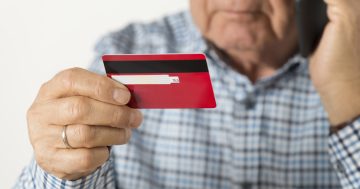Sheryl Nance-Nash* says if you’re struggling to make ends meet, a credit card cash advance might sound tempting, but it comes at a price.
 With millions of people filing for unemployment, paying the bills is a struggle for many.
With millions of people filing for unemployment, paying the bills is a struggle for many.
And if you don’t have an emergency fund, you may be turning to other options to make ends meet.
If you’ve lost a source of income or are otherwise unable to pay off your accounts, the opportunity to take out a cash advance on your credit card could seem like a viable option.
But is it?
Here’s what you need to think about before you turn to your plastic.
What is a credit card cash advance?
A cash advance is money borrowed from the credit limit of your credit card, as opposed to your bank account balance.
If you have a PIN set up for your credit card, you can withdraw your cash advance from an ATM.
You can also head to the bank with your card to request a cash advance.
Getting a cash advance on your credit card has a few advantages: It’s fast and easy to get, it doesn’t require you to have money in your bank account, and there’s also no approval process.
Unlike a loan from a bank, you don’t need to go through a credit check or submit any documents.
Cash advances aren’t as bad as payday loans when it comes to interest rates, but that’s hardly an endorsement.
Payday loans are notorious for exorbitant fees.
For two-week loans, interest rates could range from 390 per cent to 780 per cent annual percentage rate (APR).
Credit card cash advances: the cons
The advantages of a credit card cash advance pretty much stop there.
The quick fix carries consequences.
High APR
First, the interest rate is going to be high, as much as double the rate that it is on your credit card.
For many popular credit cards, the cash-advance APR is 25 per cent to 27 per cent per cent.
You won’t have a grace period, meaning you immediately accrue interest.
Additional fees
Your credit card issuer will likely charge you an additional fee.
“We see many borrowers have the amount they owe on the card balloon substantially after a cash advance, eating into available credit and putting them at risk of additional fees and larger monthly payments,” says Jeremy Lark, of GreenPath Financial Wellness.
It could affect your credit score
Understand, too, that adding to the balance on your credit card will increase your credit utilisation and work against your credit score.
The higher your credit utilisation, the bigger the negative impact on your credit score, since your amounts owed account for 30 per cent of your score.
No safety net if your money is stolen
You’re out of luck if your cash advance money is lost or stolen.
You don’t have the safety net you’d have if there was an unauthorised transaction on a credit card.
T0p alternatives to a credit card cash advance
You get that a credit card cash advance shouldn’t be your first option when an emergency rises.
But you still need money in your pocket.
There are a couple of other choices to consider.
Carry a balance on your card
Charging on your credit card is probably a better idea than getting a cash advance.
Bob Castaneda, Program Director for Walden University’s MS in Finance program, says: “It’s more beneficial for people to make regular transactions instead of getting a cash advance, due to lower interest rates and the potential of earning reward points.”
If you have a credit card that offers an introductory APR period, you could be able to avoid interest fees for a period.
If you don’t, it could be worth applying for a credit card that does, though note that issuers have been tightening their approval standards recently so it may be challenging to get one of these cards now.
Reallocate funds
See if you can get deferments on other bills like student loans or mortgage payments.
Given the pandemic, many lenders are open to such arrangements.
Consider a personal loan
See if you can get a personal loan through a credit union.
Their interest rates are typically a bit lower.
Even a loan that is instalment versus compound interest like on a credit card can be a smart play if accessible and save quite a bit of money on interest in the long run.
The bottom line: 99.9 per cent of the time, getting a credit card cash advance is a bad idea.
* Sheryl Nance-Nash is a freelance writer, specialising in personal finance, business, and travel.
This article first appeared at www.businessinsider.com.au.











